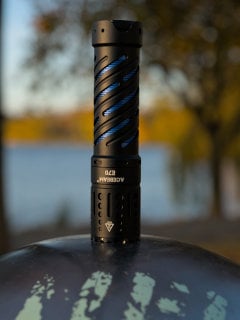You did it! That was faster than I expected lol
- 27 Posts
- 332 Comments

 2·5 days ago
2·5 days agoOh it’s much better. I flashed the latest anduril. Love it. For like two days until the button stopped working 🤦♂️
Hank is setting me up for some guy to repair it 🤷♂️

 3·5 days ago
3·5 days agoI love me some Hanklights. I’ve EDCed a D4 since they came out. Endlessly useful.
Just got a D4v2 to replace mine that got stolen a few weeks ago.

 11·6 days ago
11·6 days agoSharing Linux ISOs over BitTorrent requires connecting to other people’s computers to download the file from them.
Ports are what they sound like, ports. Like USB ports on a computer. They are places where data can travel through. But they’re also specific and unique, which can be useful.
I wrote up a big thing explaining it further but it got complicated quickly.
The basic point is, ports are a quick and easy way to determine WHERE a piece of data or request for data should go.
Your computer is on a network, and has an internal address on that network. Let’s say it’s 192.168.1.1. The Internet is a whole separate network, with its own addresses.
Your modem is assigned an address on this Internet network. Let’s say it’s 56.56.56.56.
Ok, simple, right? You have a Linux ISO I want, so my computer sends a message to yours, at your Internet address of 56.56.56.56. Theoretically that should work fine (it probably wouldn’t for complicated reasons but I digress). Your modem gets the message, forwards it to your computer which is the only computer connected to it at 192.168.1.1. Bob’s your mother’s brother.
But wait, you don’t have one computer, you’ve got an Xbox too. So you install a router, a special computer that lets you share your modem with other computers. Your Xbox has been assigned an address of 192.168.1.2. So who gets the request for the file now? The request was sent to 56.56.56.56, but the router has two options to deliver it to, and no way to know, so the request gets dropped.
To solve this, we set up port forwarding. You tell your router that all requests sent to port 5000 should be directed to 192.168.1.1. And then when you broadcast the availability of the Linux ISO, along with your Internet address you also say to use port 5000.
So now when I want a piece of your file, I send the request to 56.56.56.56:5000, and your router sees that and says hey I know where that goes. Then your computer gets the request, and happily sends the file to me.
Now let’s say you use a VPN. You have the same problem. The VPN has one Internet address, but hundreds or thousands of people using it simultaneously. If you don’t have a port assigned to you, then requests for your file will get dropped by the VPN provider, because it’s impossible to know it was meant for you.
In all these examples, you can still download FROM people, even without a pre established port. I’m honestly not entirely clear on how this works. But I’m pretty sure it has something to do with your router remembering that you just sent data (in the form of a request) to the other persons address, so when data returns FROM that address, it knows where to send it. I think. There could be, and probably is, some other trickery going on there. But I’m working from memory here 🤷♂️
Now there are other ways around ports, and other complicated details that are probably important. And things like CGNATs that basically break this fundamental function of the Internet. And I might’ve gotten some of the details I’ve told you wrong. I’m happy to be corrected.
But what I’ve said is essentially true, and should help make a clearer picture for you.
I hear what you’re saying. I understand that QSV will not work on AMD.
I’m saying that QSV only shows up as an option when the Arc card is installed. And my GPU usage only goes up when using QSV. So QSV is the correct option to use for an Arc card. The question is then, why is the Arc card performing so badly?
Thanks for the information!
My source files are 1080p recordings, but the source that made them was 480i. The 1080p source files look great, I’m just trying to ditch all the unnecessary data.
My problem is encoding speed, not any facet of the final product.
I used Intel QSV because it’s the option that showed up when I installed my Intel Arc A310 GPU with built in AV1 encoder. When I use Intel QSV, I see the usage on my Intel GPU climb to 68%, so presumably it is working as intended. It is just much slower than expected.
Do you have experience with Intel Arc cards and handbrake?
Thanks!
Thanks for the suggestions!
Hmmm, I’d think a memory r/w limit would affect CPU encoding too? The files are reading from and writing to the same high speed nvme drive, 7Gb/s read, 5Gb/s write.
Maybe the slot it’s in is only 1x for some reason? I’m pretty sure it’s an 8x slot, and the a310 only needs 4x. I can look into it.
Power limited, hard to say. It’s a 75w card that gets all it’s juice from the pcie slot, no plugs on it. My motherboard has all its plugs plugged in 🤔
Thanks for the suggestions! And good to know that it seems weird to you too, maybe I’m not crazy then haha
Oh man this is making me jealous. I’ve not gone snow camping, but I want to.
A buddy of mine is game to do it too, just gotta find the time before winter is over.
Yep. Far superior to DC.
Not even a ton. A variation of this is still my hairstyle today.
A dime sized amount of fiber paste does the job. Start by blow drying the front up into rough shape. Rub the paste between your hands using only your fingers, and work most of it into the front to hold the shape and fine tune it. Use the remainder rubbed between the entirety of your hands to pat down your crown and any flyaways. And you’re done. Quick spritz of hairspray if it’s windy or you’re planning on being really active 🤷♂️
Whole process takes 5 ish minutes. Significantly less if my hair is already in the right shape, which it usually is because I blowdry it when I get out of the shower as a matter of course.
That’s worse for me. If I haven’t seen it, best I can do is try hard and hope I catch all the details myself.
If I have seen it? I can’t help but notice that my friends are distracted during the best parts of the movie. Drives me mad. Then later they’ll be like eh I guess it was ok. Ok? Ok?! You missed the best parts! Gah…
Nopopppooooo yoouulll squish the poor kitty!!! You monster!!
/s obviously. It’s crazy how worked up people get online, how convinced they are that their way is the only right way.

 2·27 days ago
2·27 days agoAnother good option! But with all of these it looks like I’ll have to add my own driver to get anduril. So I might as well save a few bucks and have some fun modding my own maglite 🤷♂️

 3·27 days ago
3·27 days agoHmm, neat! Weird rings

 2·27 days ago
2·27 days agoYeah that definitely has the shape! Shame about the driver

 2·27 days ago
2·27 days agoThat’s a sick looking light











Is gimp no longer recommended?